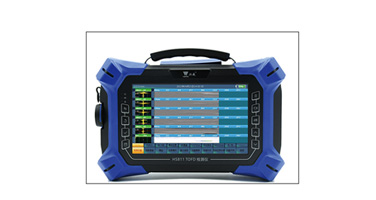Ultrasonic Testing (UT) is a branch of NDT technology that involves the emission of high-frequency acoustic energy or ultrasound into an asset for corrosion mapping, obtaining data/measurement, or identifying cracks or defects. There are three basic components included in UT.
Pulse generator/receiver: a device that emits ultrasound waves/pulses
Transducer: driven by the pulse, the transducer produces high-frequency energy which is sent to the asset in the form of a wave. When a discontinuity or defect is detected in the wave path, the energy is reflected and converted by the transducer into an electrical signal.
Data display/visualization: After the transducer has converted the electrical signal, the data is displayed on a screen for analysis by the control inspector.

HS 811 TOFD Flaw Detector
UT offers many advantages over other types of NDT, including but not limited to a safe speed, ease of use, and accuracy for the inspector.
AUT encompasses several different techniques and technologies including, but not limited to, phased array ultrasonic inspection (PAUT), rapid ultrasonic gridding (RUG), time of flight diffraction , and pulsed echo weld inspection.
So what is the real difference between manual UT (MUT) and AUT?
Two words: scanner intelligence. While an AUT involves the same components as a conventional UT or MUT (pulse/receiver, transducer, and data visualization/display device, as described above), the scanner moves the probe automatically.
With the MUT, the person performing the inspection is in control, whereas with the AUT, the parameters (i.e. speed and data logging) are controlled through the AUT device, thus eliminating the need for inspector control. the AUT may involve the same motors and mechanized scanning as in the MUT, but with UT data recorded, allowing real-time and post-inspection visual analysis and automated data processing or report writing. The process is highly repeatable and accurate.

Ultrasonic Automatic Testing Equipment For Medium And Thick Plates And Belts
For MUTs commonly used in oil and gas facilities or power plants, asset readings are taken at regular intervals. For example, for a manual ultrasonic grid, a grid is set up at predetermined distances and a reading is taken at each distance or grid. Obtaining a large amount of data can take a considerable amount of time. With AUT, large amounts of data can be collected with a much higher probability of detection quality. Continuous readings are achieved over the entire asset, rather than at specific, predefined points.
Obtaining very high-resolution data with AUT provides a better understanding of certain types of damage mechanisms that may not be apparent with MUT. It includes corrosion and wear in a broad sense, but can also depict other damage mechanisms. For example, using the MUT to inspect pipelines presents a potential risk to the ongoing operation of these pipeline circuits. If data is only sampled at intervals during the pipeline process, there is a risk of missing larger damage mechanisms, as the pipeline operation may exhibit highly variable conditions.
To take full advantage of the extensive, detailed data provided by AUT inspections, it may take days or weeks to perform.
Wuhan Zhongke Innovation Technology Co., Ltd. is a scientific and technological enterprise and a nondestructive testing equipment manufacturer with independent intellectual property rights. Moreover, the company has several core product systems which leads the development direction of China's ultrasonic nondestructive testing technology including conventional testing equipment, high-end imaging testing equipment, and all kinds of automatic detection equipment to form the whole industry chain layout from portable manual testing product to the fully automatic detection system and from design, research, development, manufacturing to field installation, debugging and training. Contact us today or visit our website.
Copyright:@2020-2021
Comments Please sign in or sign up to post.
0
0 of 500 characters used